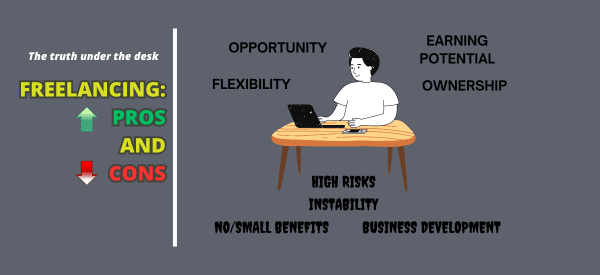Call it a post-pandemic phenomenon, but something old has become new again: the side hustle.
The term “side hustle” dates back to the 1950s, and the concept of a hustle as a way to make money outside of your full-time job goes back a decade earlier.
A popular form of hustling (aka self-employment) is freelancing, where an individual specializes in a trade or craft, and hires out to other companies on a per-hour or project basis.
Prop trading is another established way to make a part-time income.
Also referred to as “funded trading,” it usually involves working with a trading company that provides technology, training, and some support, but allows individuals to self-direct their working hours and trading strategy. And, if a prop trader finds success, they can turn prop trading into a full-time job.
Both approaches have merits, but for the ambitious and self-motivated person, they are not equal matches.
In this article, we’ll compare freelancing and prop trading as a side hustle, to give you a sense of which path offers the most potential for independence and success.
Table of Contents
The Importance of the Side Hustle
Although the global self-employment rate fell steadily from 1991 (55%) to 2019 (47.1%), according to the World Bank, the COVID-19 pandemic reversed that trend.
In the U.S., nearly 59 million people are independent workers or have a side hustle. This amounts to roughly 36% of working-age citizens—nine percentage points higher than in 2016.
Outside the U.S. and much of Europe, the numbers are even higher. That’s because for much of the world, self-employment is the best way to make a living.
By some estimates, the rate of independent work and side hustling in the U.S. is closer to 50% for Millennials and Gen Z.
Chalk it up to disillusionment with the career advice doled out for decades and low full-time wages, but it’s clear that younger generations want more control of their income.
Side hustling allows them to maintain a steady job and bring in extra money for living expenses, savings goals, luxuries, paying debt—plus the autonomy of working for yourself.
Whatever the reason, self-employment offers people the chance to grow personally and professionally and take control of their destinies.
What Is Prop Trading?
For most of their existence, stock exchanges have been physical places where traders gathered. Today, technology makes it possible for people to access global stock markets from almost anywhere in the world.
Although investment companies and banks hire professional traders as full-time employees, there are many ways to trade stocks independently.
The most obvious is going at it on your own, with your own money.
But proprietary (or prop) trading (aka funded trading) makes it easier: a prop trading company recruits traders, and provides training, certification, technology, and eventually funding for them to make trades.
Prop traders exchange stocks, commodities, currencies, and other financial instruments on national markets.
The financial backing of the prop firm allows traders to achieve far more than they would by working solo.
The Pros and Cons of Prop Trading
Pursuing prop trading as a side hustle (or eventually full-time job) has several advantages when it comes to making extra cash:
- Steady work: as long as national economies exist and the companies they host offer public stock, prop traders will always be able to make money.
- Manageable risk: legitimate prop trading firms carry the risk for any bad trades. To hedge against losing money, most prop firms require training and certification before a new candidate can use the firm’s money.
- Proprietary technology: the “prop” in “prop trading” comes from the purpose-built software and hardware that the firm offers to execute trades and analyze market data—a huge advantage over consumer or “retail” traders.
- Community: by working with a prop firm, traders connect with peers and veterans who can share tips, strategies, and hard-won wisdom. Although prop trading can be solitary, it doesn’t have to be lonely.
- High rewards: the best prop firms provide all the capital their traders use, who take home up to 90% of the profit. The more winning trades you make, the more buying power the prop firm will give you.
Of course, prop trading isn’t a cakewalk, as it comes with its unique challenges:
- High pressure: markets move fast and in unpredictable ways, and there’s no place to hide when your plan fails. You must perform winning trades day in and day out, or you won’t last.
- Competitive: there are lots of other traders working in the same markets you are. The slower you hop on a trend, the higher your risk of losing money.
- Qualifications: prop trading is risky, even for the most experienced traders. That’s why prop firms require traders to undergo extensive training and simulated trading scenarios.
- Steep learning curve: even once you’ve mastered the basics, global markets can take you for a ride. If you’re not constantly learning and pushing yourself to be a better trader, you’ll fall behind.
So, is trading a good side hustle? Sure, but it’s not for everyone. If the advantages outweigh the challenges for you, then you can easily get moving and become a prop trader.
Getting Started as a Prop Trader
The best way to get started as a prop trader is to evaluate the prop trading firms that operate or accept traders from the country you live in.
Look for characteristics such as time in business, user reviews, industry recognition, and public transparency. Then apply to the one you like the best.
The best firm isn’t likely to be the cheapest, as many charge a deposit for training and gear. But focus on what the firm offers after that: aim for those that give you the highest chance of building a successful career.
What Is Freelancing?
A freelancer is someone with a particular skill who offers it to clients, hourly or per-project.
There are freelance writers, designers, coders, accountants, carpenters, designers, video editors, and even executives (although they prefer the label “fractional”). In short, freelancing is a way to keep your autonomy and get paid for doing something you specialize in.
Sites such as Fiverr and Upwork have created global marketplaces for freelancers to advertise their services, and for companies to browse and secure talent.
Freelance remote work has become increasingly popular for established companies to grow their capacity without increasing their full-time headcount.
The Pros and Cons of Freelancing
Freelancing gives people the freedom and job satisfaction that many 9-5 jobs lack, as they can work how and where they please, and negotiate their own fees.
These are some of the benefits of freelance work:
- Flexibility: set your work schedule and the type of work you want. It’s a great way to get paid for what you do best and avoid the requirement to engage in busy work or pointless meetings.
- Opportunity: because you’re working in a niche profession, you get to pick the projects you like. The internet gives you access to a global client base, as long as you can navigate the language barriers.
- Earning potential: the more experience you have and the better your portfolio, the more you can charge for your services—a highly sought-after freelancer can make hundreds of dollars an hour. And freelance earnings are growing worldwide.
- Ownership: at the end of the day, your business is yours alone. While you’re providing services to other businesses, no one tells you what to do or how to grow. You have total control over the future of your career.
However, a freelancer’s career is often bumpy and thankless. Although you see a direct connection between your labor and your pay, it’s not always straightforward.
Invoicing, bookkeeping, and client support can steal time and joy from your days. These are some of the disadvantages:
- Instability: because a freelancer depends on clients who are willing to pay, their income is often inconsistent. When the economy is slow, clients don’t start new projects or pay top dollar.
- High risk: if a client decides not to pay you, there’s very little you can do to force the issue—when a deal goes bad, you’re liable. Plus, you don’t have financial backing to help you survive the lean times.
- Lack of benefits: most freelancers struggle to make enough money to pay for health care and retirement. That creates lots of ongoing stress, especially if you have family to support.
- Business development: word-of-mouth referrals are great, but they won’t sustain a freelancer forever. You need to actively (and constantly) build relationships, ask for work, and grow your stable of clients.
Despite the drawbacks, freelancing could be the side hustle that works best for you. In that case, here’s what you can do to get the wheels rolling.

Getting Started as a Freelancer
Many freelancers start with a side hustle.
It could be a hobby with money-making potential—such as carpentry or interior design—or a professional service that they perform outside of their 9-5 job—such as plumbing, graphic design, or software development.
The first step is to assess if you have a skill you could get paid for and then start talking to prospective clients.
Freelancers usually need a portfolio to demonstrate their abilities or a list of satisfied clients who can serve as references. This may require taking on unpaid or low-paying work to establish credibility.
The Winner Is… Prop Trading!
Many people take the freelance route, but there’s no question that working as a prop trader offers much higher earning potential with much lower risk.
You get to work from nearly anywhere in the world, doing a fast-paced, high-stakes, and lucrative job. You can start as a side hustle, then make enough money to go at it as your primary source of income.
In fact, if you become successful, you don’t even need to spend too many hours a day working on it.
The prop trading firm provides you with training, technology, and the funding necessary to capitalize on market opportunities. All you need to do is cultivate a teachable attitude and an insatiable hunger to win.
Real Trading: From Side Hustle to Long-Term Career
Real Trading is one of the few prop trading firms built entirely around trader success.
Some firms take your money and throw you to the wolves. If you survive and manage to execute winning trades, they’ll take half of your profit and act like they did you a favor. That’s no way to build a career.
We want our traders to take pride in their work and reap as many of the rewards as they can. By following our training plan, using our tech, and trading with our capital, we position you for a life-long career as a short-term trader.
Some of our traders treat it as a side hustle, and that’s ok!
However, most of them discover that prop trading is the career they’ve been looking for and jump into it full-time.
You don’t need to build up a stable of clients or juggle all the responsibilities of being a business owner. You can focus on creating a winning trading strategy and generating a profit for yourself.
No gimmicks. No shady fine print. Just a fantastic opportunity to get paid at an exciting job.
A Serious Side Hustle
Some people trade for fun. Others trade professionally.
If you started reading this article and wondered, “is trading a good side hustle?” hopefully, the answer is now crystal clear: yes!
There’s nothing wrong with adopting a side hustle that makes you an extra few hundred dollars a month. That’s why side hustles are great: you decide what fits your life and goals.
On the other hand, if you’re looking for a career offering opportunity for growth and fulfillment, apply to become a prop trader with Real Trading.





